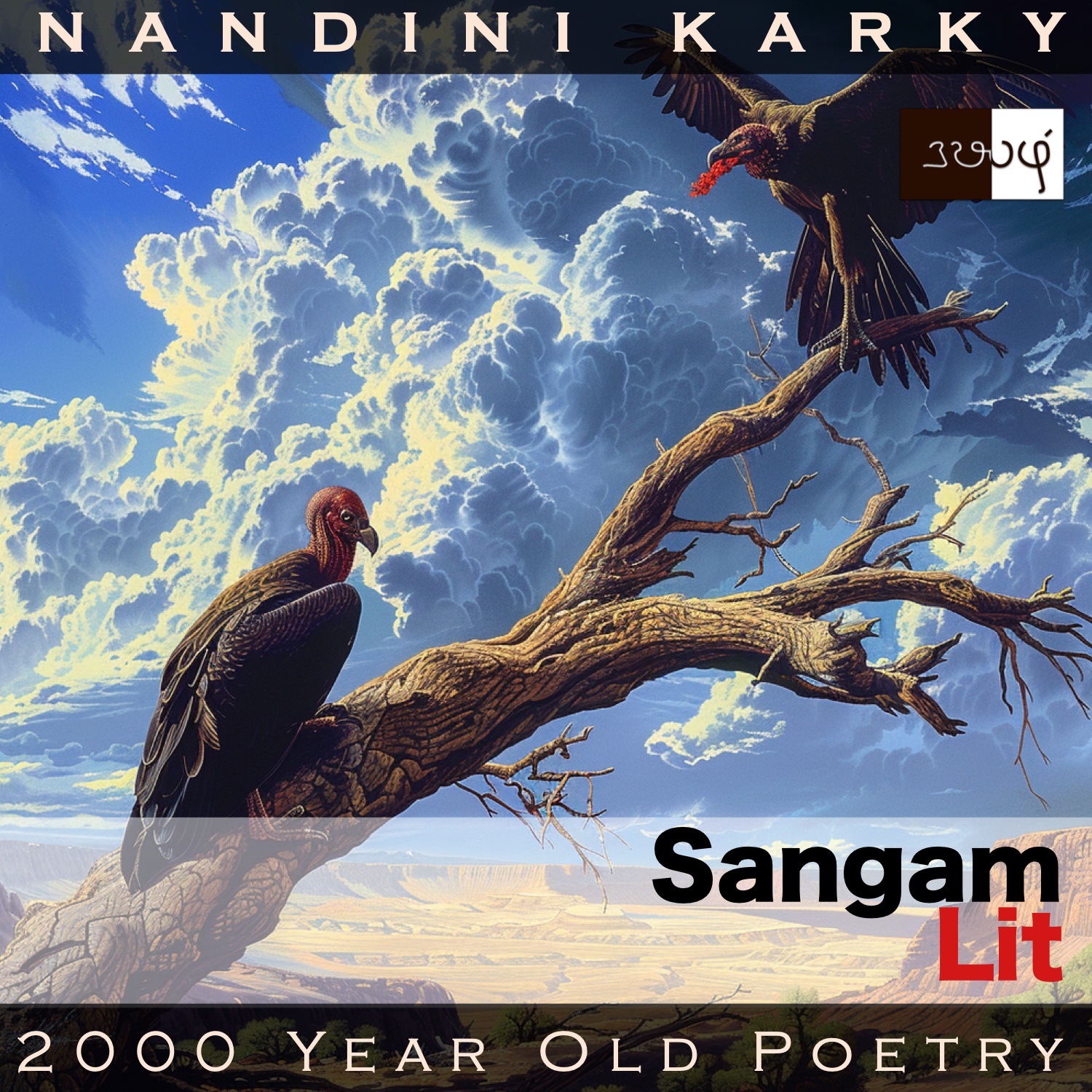Podcast: Play in new window | Download
Subscribe: Apple Podcasts | Spotify | Amazon Music | Android | iHeartRadio | TuneIn | RSS | More
In this episode, we perceive the striking shades of inner conflict , as portrayed in Sangam Literary work, Aganaanooru 3, penned by Eyinanthai Makanaar Ilankeeranaar. The verse is situated in the ‘Paalai’ or ‘Drylands landscape’ and sketches a man’s dilemma in his quest for wealth.

இருங் கழி முதலை மேஎந்தோல் அன்ன
கருங் கால் ஓமைக் காண்பு இன் பெருஞ் சினைக்
கடியுடை நனந்தலை, ஈன்று இளைப்பட்ட,
கொடு வாய்ப் பேடைக்கு அல்குஇரை தரீஇய,
மான்று வேட்டு எழுந்த செஞ் செவி எருவை
வான் தோய் சிமைய விறல் வரைக் கவாஅன்,
துளங்கு நடை மரையா வலம் படத் தொலைச்சி,
ஒண் செங் குருதி உவற்றி உண்டு அருந்துபு,
புலவுப் புலி துறந்த கலவுக் கழி கடு முடை,
கொள்ளை மாந்தரின் ஆனாது கவரும்
புல் இலை மராஅத்த அகன் சேண் அத்தம்,
கலம் தரல் உள்ளமொடு கழியக் காட்டி,
பின் நின்று துரக்கும் நெஞ்சம்! நின் வாய்
வாய்போல் பொய்ம்மொழி எவ்வம் என் களைமா
கவிர் இதழ் அன்ன காண்பு இன் செவ் வாய்,
அம் தீம் கிளவி, ஆய் இழை, மடந்தை
கொடுங் குழைக்கு அமர்த்த நோக்கம்
நெடுஞ் சேண் ஆர் இடை விலங்கும் ஞான்றே?
As promised, every other song, the odd numbered ones, are taking us to the drylands and in this particular song, the descriptions are so vivid, and seem like a nature documentary is playing out on paper. Here are the words spoken by the man to his heart, at the juncture when his heart pushes him to part away so as to seek wealth:
“Akin to the scaly skin of a crocodile in the salty backwaters, spreads the huge branch of the alluring, dark-trunked toothbrush tree. Upon this branch in that fearsome, wide space, rests a female bird with a curved beak, exhausted after giving birth. So as to bring good food for this young mother, its mate, the red-headed male vulture, which had been lying down in confusion, stands up and soars towards the sky-high peaks of the mountain ranges. In the slopes, it spots a mountain goat with a swaying gait, which has been attacked and killed by a tiger, which has then drunk up the radiant, red blood of the mountain goat with relish. The male vulture then ceaselessly steals the smelling flesh of this carcass, abandoned by the flesh-reeking tiger, akin to highway robbers, in that wide and faraway drylands, filled with dull-leaved burflower trees!
O heart, you stand behind me and nudge me, pointing to those drylands, asking me to travel thither and bring back wealth! How will these truth-like falsehoods from your mouth save me from my suffering, at that moment, when the beautiful eyes, set in perfect proportion to the heavy earrings, belonging to my naive maiden, wearing well-etched ornaments, and having red lips, akin to coral tree petals that render beautiful and sweet words, appear before me and block me in that long and winding, formidable path in the drylands?”
Time to delve into the nuances. The man starts with an intricate description of the drylands. First, we get to see the skin of a saltwater crocodile in the backwaters. Wait a minute, isn’t this the drylands? Why are we talking about the backwaters that are out of place here? Only to bring that striking image from another landscape as a parallel to the bark on the branch of a toothbrush tree that stands in these very drylands. A moment to reflect on the crocodiles referred! I learnt that though saltwater crocodiles were present in huge numbers in both Tamilnadu and Kerala. They were hunted to extinction around the 1930s and now all we have are the mugger or marsh freshwater crocodiles in these regions. By comparing the skin of a crocodile and the bark of a toothbrush tree, the Sangam poets bring flora and fauna together, representing the oneness of life. Moving on, the toothbrush tree has been brought to our attention to spotlight a tired mother vulture that has just given birth. Next to it, we see its mate, a male vulture with red ears. It has been lying there, not knowing what to do. It decides it must do something for its mate and so it stands up and soars in search of food. Roving the skies, on the mountain slopes, the keen-eyed vulture spots a mountain goat being felled by a tiger. The tiger then drinks up the blood and leaves the spoils behind, upon which our vulture scavenges and takes back the loot, like the thieving denizens of that drylands, the man describes.
The man now turns to his heart and says that it has been pestering him to go to these drylands and beyond to bring back wealth. However, his past experiences make him turn to his heart and ask how can it even help him when the beautiful eyes of his lady appear in the middle of his journey and torment him! Saying so, the man decides not to venture forth, parting with the lady. In the description of the female vulture and its caring mate, the man places a metaphor for his own intention of providing for his lady and bringing back wealth for their happy life. At the same time, he’s conflicted because the pain of parting with her was too much for him to bear on a prior journey and he knows the same will follow him this time too. We have seen countless songs wherein the Sangam woman laments that the man has left her behind and parted away. To some extent, balance is restored by verses like this one, wherein men too feel the pain in parting and express to the world that love is not just a one-way path through those dreary but dramatic drylands!




Share your thoughts...